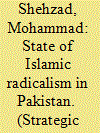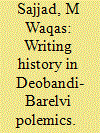|
|
|
Sort Order |
|
|
|
Items / Page
|
|
|
|
|
|
|
| Srl | Item |
| 1 |
ID:
118139


|
|
|
|
|
| Publication |
2013.
|
| Summary/Abstract |
The soil of Pakistan, because of its culture, customs, traditions, values, the temperament of the people and even state policies, provides the ideal ground for Islamic radicalism, extremism, sectarianism and terrorism. The foundation of religious bigotry and Islamic fundamentalism had been laid down in Pakistan-perhaps inadvertently-when poets like Allama Iqbal dreamt of Pakistan and the All-India Muslim League coined the term 'Two-Nation Theory' (TNT, to be read apart from an explosive that goes by the same acronym) under the leadership of Mohammad Ali Jinnah, raising the demand for a separate homeland for the Muslims of the subcontinent. At that time, the ultimate objective was to safeguard and secure the interests of the Muslim feudal lords (especially in the Muslim minority provinces of British India) and get rid of the perceived supremacy of the Hindus in a representative and democratic setup. The basic assumption that drove the demand for separation at that time was that the Muslims-namely the Shias, the Ahmadis, the Barelvis, the Ahle Hadith and the Deobandis-constituted one nation and they could not co-exist with the Hindus, the other nation.
|
|
|
|
|
|
|
|
|
|
|
|
|
|
|
|
| 2 |
ID:
190727


|
|
|
|
|
| Summary/Abstract |
The Deobandi-Barelvi conflict in South Asia is conventionally over religious beliefs and practices. However, it also has an earlier dimension, encompassing the early nineteenth century theological debate between Shah Ismail and Fazl-e-Haq Khairabadi. Deobandi and Barelvi polemicists rewrite this history to establish their own tradition and identity within a particular narrative of the past, linked to the family of Shah Waliullah. The Barelvis portray their founder, Ahmed Raza Khan, as belonging to the tradition of both Waliullah and Khairabadi, and against Ismail, while the Deobandis highlight Ismail’s orthodoxy. In doing so, polemicists rewrite the past and ensure that the dimension of history is a significant aspect of their conflict today as distinct oppositional identities are created.
|
|
|
|
|
|
|
|
|
|
|
|
|
|
|
|
|
|
|
|
|